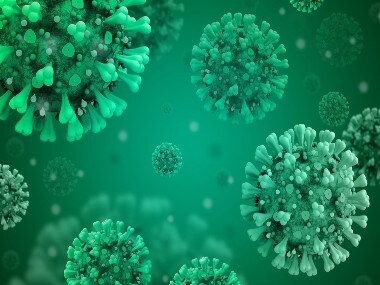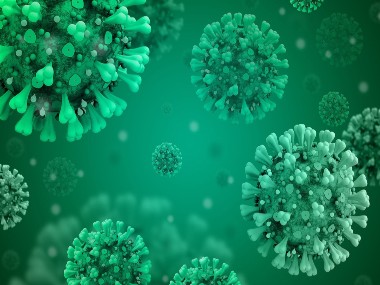It has been about 6 months since the first case of COVID-19 showed up in Wuhan, China. Since then the scientific community has learnt a lot about this disease and its causative virus SARS-CoV-2.
It is well-known that the elderly, men and those with comorbidities are at a higher risk of severe COVID-19. Now, a preprint, non-peer reviewed
study
on the genome (all the DNA in a person) of COVID-19 patients from Italy and Spain suggests that there are certain genes that may make a patient more prone to respiratory failure. [caption id=“attachment_8312371” align=“alignleft” width=“380”]
 Representational image. Pixabay/Masum Ali[/caption] Respiratory failure is when your body does not get enough oxygen from your lungs or when your blood carbon dioxide level goes too high. It occurs due to various conditions including pneumonia (one of the presentations of COVID-19). If left untreated, it can cause arrhythmia (irregular heartbeat) and organ damage. Respiratory failure occurs in about 10 percent of COVID-19 patients. The study About 835 patients from Italy and 775 from Spain were included in the study. A total of 1,225 people from Italy and 950 from Spain were kept as controls (they did not have the disease). The genome of all the volunteers was studied. It was observed that several genes located on two chromosomes - chromosome 3 and 9 - may have an association with severe COVID-19. Chromosomes are highly coiled DNA strands. The human genome has a total of 23 pairs of chromosomes, half of every pair comes from each of the parents. Each chromosome has several genes that code for various traits in the body. Genes code for everything right from the enzymes in your body to the colour of your eye. In particular, chromosome 3 has a gene that codes for a glycoprotein called Sodium/Imino-acid (proline) Transporter 1 (SIT1) which is present on the surface of air sacs in lungs and also interacts with the enzyme ACE-2. The study suggests that just like the ACE-2 receptors, SARS-CoV-2 may also be using SIT1 to enter into host cells and, as a result, may need to be studied further. However, the same area that contains the SIT1 gene also has another gene that codes for a compound that has a role in managing the presence of memory CD8 T-cells throughout the lungs. Memory cells are those cells of the immune system that protect our body from reinfection from the same pathogen. CD8 T-cells kill virus-infected cells. On the other hand, chromosome 9 has shown some genes that are associated with ABO blood groups. This suggests that people with A blood group may be more susceptible to the disease and those with O blood group may have a protective effect. Not the first study This is not the first research that mentions the link between genes and severe COVID-19. Database from the
Home Genetics Consortium
has also shown similar findings, although it may not be a genome-level research. Home genetics consortium is a global initiative that brings together experts around the world to study and share their research on the link between host genetic factors and susceptibility to and the risk of severe COVID-19. At least two different clinical studies have linked ABO blood group with COVID-19 risk and severity and have suggested A blood group to be more susceptible. Earlier studies done on the SARS (Severe Acute Respiratory Syndrome) indicated that anti-A antibodies can prevent the binding of SARS-CoV virus to the ACE2 receptors. Our blood group A and B represent two sugars present on the RBCs (red blood cells). Those who have A sugar are of A blood group, those with B sugar have B blood type and those who have none are O type. If you transfer the wrong blood type to a person, their body will take the sugar that it does not have as an antigen and make antibodies against it. For example, a person with A blood group will make antibodies against B sugar and vice versa. Someone with O group will make antibodies against both sugars. This is why it is important to transfuse the right blood group. One bias (as the author mentioned) in genetic studies is that they are more likely to take severe cases than asymptomatic ones. The presence of more risk alleles (alternative forms of a gene) on chromosome 3 in severe patients on mechanical ventilation rather than those requiring only oxygen points to a strong link of this chromosome with COVID-19. However, more studies are needed to better understand the current information and how it can be used in clinical settings. For more information, read our article on
Different complications seen in COVID-19 patients
Health articles in Firstpost are written by myUpchar.com, India’s first and biggest resource for verified medical information. At myUpchar, researchers and journalists work with doctors to bring you information on all things health.
Representational image. Pixabay/Masum Ali[/caption] Respiratory failure is when your body does not get enough oxygen from your lungs or when your blood carbon dioxide level goes too high. It occurs due to various conditions including pneumonia (one of the presentations of COVID-19). If left untreated, it can cause arrhythmia (irregular heartbeat) and organ damage. Respiratory failure occurs in about 10 percent of COVID-19 patients. The study About 835 patients from Italy and 775 from Spain were included in the study. A total of 1,225 people from Italy and 950 from Spain were kept as controls (they did not have the disease). The genome of all the volunteers was studied. It was observed that several genes located on two chromosomes - chromosome 3 and 9 - may have an association with severe COVID-19. Chromosomes are highly coiled DNA strands. The human genome has a total of 23 pairs of chromosomes, half of every pair comes from each of the parents. Each chromosome has several genes that code for various traits in the body. Genes code for everything right from the enzymes in your body to the colour of your eye. In particular, chromosome 3 has a gene that codes for a glycoprotein called Sodium/Imino-acid (proline) Transporter 1 (SIT1) which is present on the surface of air sacs in lungs and also interacts with the enzyme ACE-2. The study suggests that just like the ACE-2 receptors, SARS-CoV-2 may also be using SIT1 to enter into host cells and, as a result, may need to be studied further. However, the same area that contains the SIT1 gene also has another gene that codes for a compound that has a role in managing the presence of memory CD8 T-cells throughout the lungs. Memory cells are those cells of the immune system that protect our body from reinfection from the same pathogen. CD8 T-cells kill virus-infected cells. On the other hand, chromosome 9 has shown some genes that are associated with ABO blood groups. This suggests that people with A blood group may be more susceptible to the disease and those with O blood group may have a protective effect. Not the first study This is not the first research that mentions the link between genes and severe COVID-19. Database from the
Home Genetics Consortium
has also shown similar findings, although it may not be a genome-level research. Home genetics consortium is a global initiative that brings together experts around the world to study and share their research on the link between host genetic factors and susceptibility to and the risk of severe COVID-19. At least two different clinical studies have linked ABO blood group with COVID-19 risk and severity and have suggested A blood group to be more susceptible. Earlier studies done on the SARS (Severe Acute Respiratory Syndrome) indicated that anti-A antibodies can prevent the binding of SARS-CoV virus to the ACE2 receptors. Our blood group A and B represent two sugars present on the RBCs (red blood cells). Those who have A sugar are of A blood group, those with B sugar have B blood type and those who have none are O type. If you transfer the wrong blood type to a person, their body will take the sugar that it does not have as an antigen and make antibodies against it. For example, a person with A blood group will make antibodies against B sugar and vice versa. Someone with O group will make antibodies against both sugars. This is why it is important to transfuse the right blood group. One bias (as the author mentioned) in genetic studies is that they are more likely to take severe cases than asymptomatic ones. The presence of more risk alleles (alternative forms of a gene) on chromosome 3 in severe patients on mechanical ventilation rather than those requiring only oxygen points to a strong link of this chromosome with COVID-19. However, more studies are needed to better understand the current information and how it can be used in clinical settings. For more information, read our article on
Different complications seen in COVID-19 patients
Health articles in Firstpost are written by myUpchar.com, India’s first and biggest resource for verified medical information. At myUpchar, researchers and journalists work with doctors to bring you information on all things health.
)